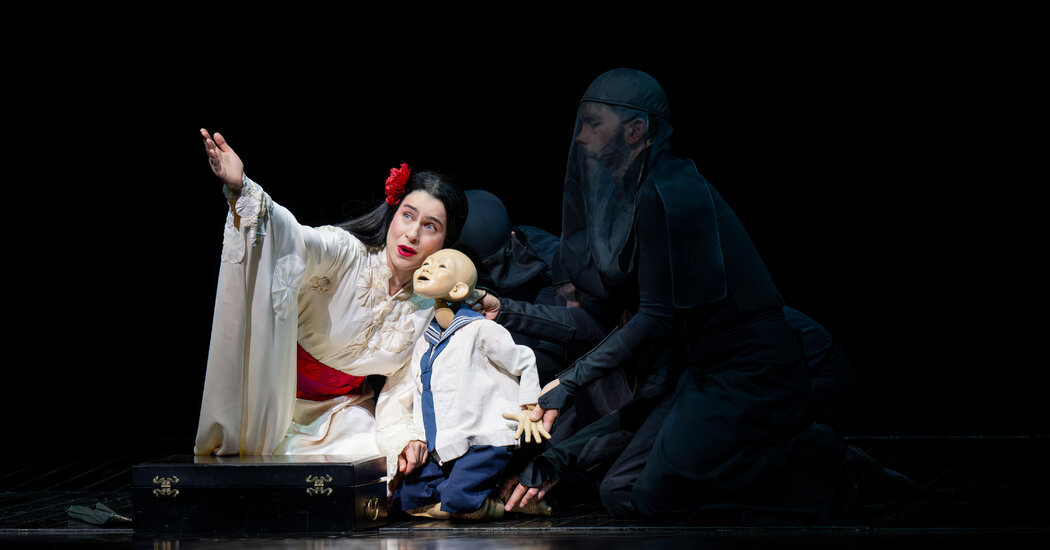In the most heartbreaking scene of Puccini’s opera “Madama Butterfly,” the title character waits. A teenage geisha married off to an American naval lieutenant, she remains devoted to him long after he abandons her. He will return, she believes — one fine day.
When she sees his ship approaching the shores of Japan, she and her maid ecstatically prepare the home for him. They gather flowers and spread them at the door; Butterfly rouges her cheeks and puts on the wedding garments she wore the night she and the lieutenant fell in love. Then she, their son and the maid look out through a screen and wait. The boy falls asleep first, followed by the maid. But Butterfly stays awake all night, expecting a husband who never comes.
Moments like this are perfect for the Lithuanian soprano Asmik Grigorian, a fiercely intelligent and captivating singer who made her debut at the Metropolitan Opera on Friday. She comes to New York having already reached star status abroad, and it didn’t take long in “Butterfly” to see why.
After Grigorian knelt to wait, she smiled at her son, played by an affecting bunraku puppet. Then she let out a deep exhale and perfected her posture before reaching out to hold the hand of her maid, Suzuki. As the scene went on, her eyes seemed on the verge of tears, but only on the verge. She appeared overwhelmed with either anticipation or disappointment, or both.
Opera is known for its elevated expression, of which there is plenty in “Butterfly,” a tragedy from start to finish. But Grigorian is the type of singer who also behaves like a skilled, nuanced actress. She persuasively inhabits a character, imbuing performances of plush lyricism with empathy, sophistication and even a touch of spontaneity.
Complicated characters like Jenufa and Tatiana, of “Eugene Onegin,” suit her well, though Grigorian’s sprawling repertoire also includes Mrs. Lovett from “Sweeney Todd” and, in a stunt at the Salzburg Festival, all three soprano roles in the one-acts of “Il Trittico.” For years she rose through the stages of Europe; then, in 2018, she gave a ferocious, star-making performance as Salome.
But if fame can happen overnight in opera, the bookings that come from it don’t take shape for five or so years, which is why Grigorian’s career has continued to be focused abroad until now. She is best, though, in those smaller, European opera houses, which are often half the size of the Met, and where audiences can easily read the humanity of her gestures and the restless expressivity of her face.
At the Met, singers are more reliant on sound than acting to make an impression; Grigorian can distinguish herself in both, though the size of her voice, hardly that of a future Brünnhilde, doesn’t make it easy on such an enormous stage.
It also doesn’t help that in “Butterfly,” she made her entrance from the back of the set, behind a veil. Still, she warmed up into a remarkable debut. Grigorian’s voice is richest in the middle of its range, with a precarious bottom but a top capable of penetrating with either radiance or a soft glow. During her first scene, as she was introduced to the lieutenant, Benjamin Franklin Pinkerton, her passaggio was seamless, with smooth climbs in both pitch and power. Her blend of youthful, perhaps even performative, naïveté and genuine trepidation immediately gave her character the complexity she deserves.
In the famous aria “Un bel dì,” or “One fine day,” every line seemed considered without being mannered, as if Grigorian’s Cio-Cio-San (the actual name of Butterfly) were thinking through her feelings in real time: joy, hope, defiance. She grabbed Suzuki by the shoulders, trying to shake sense into her, before shaking herself out of blissful reverie. You believed her screams, and feared the hand she raised in anger.
This revival of “Butterfly,” which will be simulcast in cinemas on May 11, has another notable debut in the conductor, Xian Zhang, the music director of New Jersey Symphony Orchestra. She led with brisk tempos, sensitive to Puccini’s shifts between Orientalist whole tones and love-drunk chromaticism, and reserving eruptive forces — including a pounding, death-driven drumbeat — for maximal effect.
The mezzo-soprano Elizabeth DeShong was a commanding, mighty Suzuki, a humane foil to the similarly powerful but chillier Sharpless as sung by the baritone Lucas Meachem. With the tenor Jonathan Tetelman out sick, Chad Shelton jumped in as Pinkerton, with a creamy sound but an ordinariness that paled next to Grigorian’s Cio-Cio-San.
Grigorian’s debut is all the more striking when you consider that the Met’s “Butterfly,” a gorgeously lacquered and mirrored staging by Anthony Minghella from 2006, is the kind of show that gets the least amount of rehearsal time in a repertory house. It already opened in January; Grigorian is only joining its final five performances of the season. So, if this is what it looks like when she steps into a revival, just wait until she stars in a new production.
Madama Butterfly
Through May 11 at the Metropolitan Opera, Manhattan; metopera.org.
